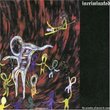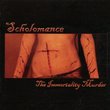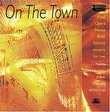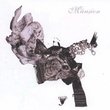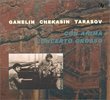| All Artists: Duke Ellington Title: Piano in the Foreground (Reis) Members Wishing: 1 Total Copies: 0 Label: Sony Release Date: 7/27/2004 Album Type: Extra tracks, Original recording remastered Genres: Blues, Jazz, Pop, Broadway & Vocalists Styles: Swing Jazz, Orchestral Jazz, Traditional Vocal Pop Number of Discs: 1 SwapaCD Credits: 1 UPC: 696998704220 |
Search - Duke Ellington :: Piano in the Foreground (Reis)
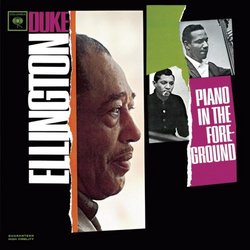 | Duke Ellington Piano in the Foreground (Reis) Genres: Blues, Jazz, Pop, Broadway & Vocalists
Duke Ellington's piano style influenced generations of pianists, from Thelonious Monk to Randy Weston. This 1961 trio recording, with his orchestra's rhythm section of drummer Sam Woodyard and Aaron Bell, clearly unveils t... more » |
Larger Image |
CD DetailsSynopsis
Amazon.com Duke Ellington's piano style influenced generations of pianists, from Thelonious Monk to Randy Weston. This 1961 trio recording, with his orchestra's rhythm section of drummer Sam Woodyard and Aaron Bell, clearly unveils the maestro's powerful touch, black-and-tan chords, and unstoppable swing, all often overshadowed in the work of his bigger bands. The standard "Body and Soul" shows Ellington's debt to James P. Johnson's Harlem stride style, while "Blues for Jerry," recalls Count Basie's Kansas City grooves. "Cong-go" masterfully marries Nigerian highlife and Cuban congorhythms, while Gershwin's "Summertime" and "Springtime in Africa" become surprising, evocative tone poems that foreshadow the avant-garde abstractions of the '70s. There's also a deeply personal rendering of Billy Strayhorn's "Lotus Blossom," which was not included on the original LP. The last six bonus tracks come from a pair of 1957 sessions with Jimmy Woode on bass. All in all, this disc is a worthy addition to Ellington's other keyboard classics, Money Jungle and Piano Reflections. --Eugene Holley, Jr. Similar CDs
|
CD ReviewsOne For The Piano Player! Michael F. Hopkins | Buffalo, NY USA | 08/14/2004 (5 out of 5 stars) "Eloquent expression, energetic inspiration, iridescent swing. Welcome to the world of Duke Ellington. Pioneer orchestrator, master composer, musical colossus of the 20th century, and beyond. African American genius of the Big Band and more, he spent a lifetime showcasing the world as his podium. For his song, the stage is still set, players from all walks carrying forth the next act, all vowing to never forget. Bearing all that in mind, come on in to one of the most intimate, magical sessions ever conceived by the Duke. A rare classic from 1961 (with equally rare bonus tracks from 1957), this is a trio setting which features Ellington at the piano, and what a treat it is! With drummer Sam Woodyard providing subtle nuance, and bassist Aaron Bell (Jimmy Woode on the bonus tracks) threading supple tapestries, the Duke unleashes a bountiful program of standards and originals which cuts loose with a dancing intensity. From the nimble caress of "I Can't Get Started" to a prowling, grimly smiling deconstruction of "Summertime" tipping its hat to Cecil Taylor, you feel the very air around you become charged with spirit, with promise. Listen on, through the sweep and circumstance of "Body And Soul" and the hip-hugging boogie of "Cong-Go", through the luscious, beckoning quiet of "Springtime In Africa", to the sheer color & magnificence of "All The Things You Are" (the second take of which begins with a hearty dissonant nod to Thelonious Monk!}. The finish is not one, but four types of "Piano Improvisation" which run the gamut from salient mood portraits to a honky tonk vignette gleefully brandishing the Duke's roots in the Harlem Stride of James P. Johnson and Fats Waller. In the final hop, jitterbugs and straight suits all waltz together into the jump of Destiny. At album's end, you are one with the dance, its melodies lingering on, ever on..." The Piano Player F. Hagan | Raleigh, North Carolina, USA | 09/08/2004 (5 out of 5 stars) "There is something inescapably elegant about a piano accompanied by a stand up base and a drum set. The traditional piano lead ensemble is at the heart of groovy jazz and the big band arrangement, and an example of the many reasons that one of the greatest composer/arranger, and conductor's of the 20th century referred to himself, depreciatively, as "the piano player." It has been argued that the real instrument he played was his orchestra, and it might be added that Billy Strayhorn normally played the piano in recording sessions, therefore, this newest offering of a Duke Ellington compilation, "Piano In The Foreground (Legacy)," is something uniquely special. It is the Duke, himself, playing with a minimalist ensemble, so that the full measure of his musicianship can be enjoyed. These session recordings, taking place in New York and Los Angeles from 1956 to 1961, assemble material from several harder to find sources, with excellent bonus offerings for the fortunate consumer. Dancers who enjoy the groove sound will certainly appreciate "I Can't Get Started," "It's Bad to Be Forgotten," "A Hundred Dreams Ago," and "So." The first track mentioned being this reviewer's personal pick for most played out of simple listening enjoyment. This is a great mood album, and the piano captures the emotional intent of each piece, as evidenced in great arrangements of "Body and Soul" and "Blues for Jerry." There's some great rhythmic vibes to be experienced in "Cong-Go" and "Springtime in Africa." The majority of the tracks are Ellington compositions, with only a smattering of Gershwin, Hammerstein, and a few others. The bonus tracks are perhaps the most fascinating, because they show the limitless creative potential of the Duke, offering two takes on interpreting "All The Things You Are," and then giving the listener four piano improvisations, creating an observation window into the mind of such a special talent. This is rich instrumental work that is the essence of class and style. From the rich melody of "Searching (Pleading for Love)" to the delicate petals of "Lotus Blossom," this is an album for anyone who appreciates the piano, and once more, the man playing it. " ...but his real instrument is the Piano! jive rhapsodist | NYC, NY United States | 02/07/2007 (5 out of 5 stars) "You all know the received wisdom: "Ellington plays piano, but his real instrument is the band". True enough in the '20's and '30's. True through most of the '40's. But 1947 (?)'s The Clothed Woman and New York City Blues introduced a new rub into the Ellington world. From then on, many of his most radical, searching ideas would be expressed through the piano, and the piano only. Did he not figure out an approach to scoring these ideas, or did he see these domains as essentially separate? We can't really know...but meanwhile there's this modest masterpiece of a CD, by far the finest piano record he ever made (well, there aren't so many to choose from, but still...). Summertime (track 6) goes quite far into Cecil Taylor territory, and is probably the high point of the session, but it's all pretty fantastic. Searching (track 10) is an idea he would keep fussing with - it's somewhat connected to 1950's Janet and shows up again on one of his last sessions - the duo with Ray Brown. The change in his playing between this session (1961) and that one (1972) is fascinating. His playing is much more incisive there, but his touch isn't nearly so beautiful. So (track 9) is one of those rare pieces where Ellington seems to almost let down the elegant mask - it has something rueful, nostalgic and indominable about it. Understated, funky and beautiful. This one's a no-brainer: get it or have an unfillable gap in your collection!"
|

 Track Listings (18) - Disc #1
Track Listings (18) - Disc #1